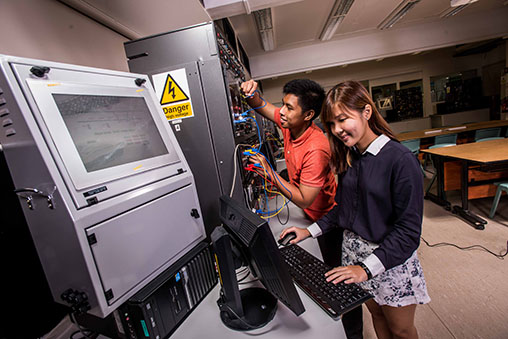Wednesday, 25/02/2026 | 21:22 GMT+7
ABB, the leading power and automation technology group, has inked a Memorandum Of Understanding (MOU) with Singapore Polytechnic (SP) to advance hands-on training for the next generation of engineering professionals. The MOU will enable a comprehensive education in energy efficiency technology and management, complementing classroom teaching and demonstrating the real-world application of energy efficiency.
The five-year joint investment of around S$350,000 includes internship opportunities and the establishment of an Energy Efficiency Learning Lab to enhance the skills and knowledge of the polytechnic’s students and staff in line with the nation’s SkillsFuture Programme.
According to the Energy Market Authority (EMA), Singapore will need 10,000 technical professionals across the energy sector to maintain its economic growth over the next 10 years1. The challenges of increasing market demand and ageing workforce, coupled with the government’s direction towards a ‘Smart Nation’, prompted an urgent need for young energy management professionals who are able to integrate and manage multiple energy systems and technologies.
Through this collaboration, selected students will embark on a 22-week enhanced internship programme with experienced ABB engineers as mentors. Students will work on projects encompassing designing, managing and integrating energy systems, and have the opportunity to have exposure and experience to ABB’s portfolio in power and automation, helping to realize their potential and enabling them to be well-placed in a changing energy and industrial landscape.

Singapore has made a pledge to stabilize and limit its yearly greenhouse gas emissions to about 65 million tonnes by 2030. This is part of the country's contributions to the United Nations Framework Convention on Climate Change Secretariat. More efficient use of energy across industries, utilities, transportation and buildings will contribute significantly to this commitment.2
A learning platform that serves to enrich curriculum and better engage students in coursework combining theory with practical training, the Energy Efficiency Learning Lab is equipped with high-efficiency motors, drives, power meters and circuit breakers that monitor power quality and perform energy management, enabling the evolution of smart grids on SP’s campus. Each year, close to 1,000 full-time engineering diploma students, and existing energy professionals under the Continuing Education and Training (CET) framework, will benefit from the facility through designing, managing and maintaining these energy systems and technologies, empowering them to develop work-ready competencies. Educator training will also ensure that industry-specific knowledge remains at global standards.
“Increasing energy efficiency offers the greatest potential for reducing CO2 emissions, and energy efficiency improvements could deliver half the cuts in emissions needed to slow global warming over the next 25 years. As well as helping our customers directly, we are proud to be contributing to the Singapore effort through engineering education, helping industries to foster sustainable and innovative approaches to energy efficient technologies for future generations to come,” said Johan de Villiers, country managing director of ABB in Singapore.
“The collaboration with ABB is a significant milestone for Singapore Polytechnic, especially in the area of nurturing students from both the Diploma in Electrical and Electronic Engineering and Diploma in Energy Systems and Management to contribute to Singapore’s continued success. I am confident that the practical internship experience at ABB and the latest high-tech facility will further enhance our student learning experience,” said Lim Peng Hun, Deputy Principal of Singapore Polytechnic.
The Memorandum of Understanding is a continuation of ABB’s long-standing relationship with Singapore Polytechnic to encourage educational excellence in engineering. In addition to this latest development, ABB plays important roles on the Advisory Panel of the Food Innovation and Resource Centre (FIRC), and on the Advisory Committees of the School of Electrical & Electronics Engineering and the School of Mechanical and Aeronautical Engineering.
Anh Tuan








 Consultation on the methodology for developing and updating energy consumption standards for four major industrial sectors
Consultation on the methodology for developing and updating energy consumption standards for four major industrial sectors
 Opening of the 2025 Energy-Efficient Equipment and Green Transition Exhibition Fair
Opening of the 2025 Energy-Efficient Equipment and Green Transition Exhibition Fair
 Energy-saving solutions and green transition promotion
Energy-saving solutions and green transition promotion
 The 9th VEPG Steering Committee Meeting: Strengthening Coordination for Viet Nam’s Just Energy Transition
The 9th VEPG Steering Committee Meeting: Strengthening Coordination for Viet Nam’s Just Energy Transition